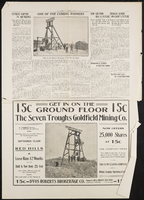Search the Special Collections and Archives Portal
Search Results
Hal Rothman Faculty Papers
Identifier
Abstract
The Hal Rothman Faculty Papers (approximately 1930-2006) are comprised primarily of research, teaching, and professional papers of Hal Rothman, professor of history at the University of Nevada, Las Vegas (UNLV). The papers include Rothman's research notes, manuscript drafts, conference articles, lecture notes, audiovisual material for his book
Archival Collection
Phillip L. Cook oral history interview
Identifier
Abstract
Oral history interview with Phillip L. Cook conducted by Richard Strahan on March 3, 1977 for the Ralph Roske Oral History Project on Early Las Vegas. Cook first talks about his parents' move to Nevada and discusses how the school system has changed over time. He then describes the first businesses that opened up in the Downtown and Strip areas of Las Vegas, Nevada before discussing prostitution, Block 16, and recreational activities available to youth. Cook also talks about the first television sets and telephone systems made available, and he moves on to talk about the prices of things such as movies and haircuts when he was younger. The interview then moves to discussions on the Old Ranch, racial discrimination, school integration, the crime rate, and the school system in Las Vegas.
Archival Collection

Gene Noboru Nakanishi oral history interview: transcript
Date
Archival Collection
Description
Oral history interview with Gene Noboru Nakanishi conducted by Ayrton Yamaguchi, Cecilia Winchell, and Stefani Evans on April 2, 2021 for Reflections: The Las Vegas Asian American and Pacific Islander Oral History Project. Gene Nakanishi shares his detailed family history from both his father's and his mother's families. He discusses his paternal grandfather's work on the Union Pacific Railroad, the family's internment in Wyoming during World War II, and his father's release from the camp by joining the United States Army Signal Corps. Nakanishi also talks of his maternal grandfather who was of the Bushido ("warrior") class in Osaka, Japan, and his grandfather's work with Christian missionaries. He shares details of his mother's restaurant employment in Los Angeles and her opening of Osaka Japanese Bistro in Las Vegas in 1969. Nakanishi also talks about being born and raised in Las Vegas, his musical schooling at Berklee College of Music in Boston, and his graduate education at Harvard University. He discusses his work as a band teacher for the Clark County School District, his involvement in the Idyllwild Arts Summer Program band camp, and his interests in jazz music.
Text

Arturo Ochoa interview, April 9, 2019: transcript
Date
Archival Collection
Description
On the corner of Eastern and Stewart, inside the East Las Vegas Community Center, lies an oasis of creativity and art. The halls ring with the sound of harmonious music coming from the meeting rooms, where children move violin bows up and down in a synchronized motion. They stare with concentration at the music sheets in front of them. They gracefully play together and fill the empty halls with classical music. For most of them, they are the first in their family to learn how to play an instrument. Like many in their neighborhood, they are also first-generation Americans. The students are rehearsing for their recital with the Las Vegas Philharmonic at the Smith Center in a few weeks. In the back of the room there is a man gleaming with pride and joy. The Foundation to Assist Young Musicians (FAYM) provides the rehearsal space, violins, and music lessons at the community center and allows these children to flourish despite their economic, social, or racial background through, “Building
Text
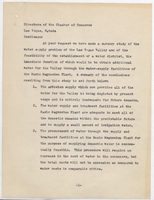
Letter from Alfred J. Ryan to the Directors of the Las Vegas Chamber of Commerce, circa 1950
Date
Archival Collection
Description
Discussion of the feasibility of bringing water from Lake Mead to Las Vegas. Pittman is an older name for the city of Henderson. Whitney is an older name for East Las Vegas.
Text

Meeting minutes for Consolidated Student Senate University of Nevada, Las Vegas, April 13, 1989
Date
Archival Collection
Description
Text
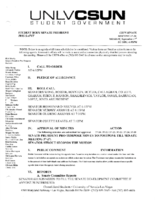
Meeting minutes for Consolidated Student Senate, University of Nevada, Las Vegas, September 17, 2007
Date
Archival Collection
Description
Text
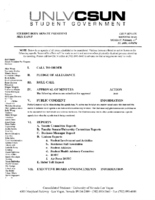
Meeting minutes for Consolidated Student Senate, University of Nevada, Las Vegas, February 11, 2008
Date
Archival Collection
Description
Text
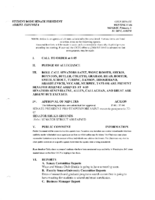
Meeting minutes for Consolidated Student Senate, University of Nevada, Las Vegas, February 05, 2007
Date
Archival Collection
Description
Text

